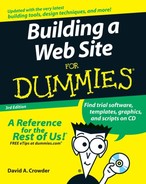Chapter 17. Publicizing Your Site
In This Chapter |
|
Search sites (also called search engines) are a critical part of the World Wide Web. Without them, it’s nearly impossible for most people to find what they’re looking for. Therefore, if you’re serious about your Web site (and I assume that you are because you’re reading this book), it’s important to know as much about search sites as possible (such as by hands-on, real-life experiences). And you can’t do much better than trying out the search sites yourself. You can find out which ones give helpful responses to your queries and which ones return nonsense. For even more info, check out Search Engine Optimization For Dummies, by Peter Kent (Wiley Publishing), which goes into very fine detail about what readers can do to get their sites listed in the search engines.
Table 17-1 lists the major search sites.
| Search Site | Web Address |
|---|---|
| AlltheWeb | www.alltheweb.com |
| AltaVista | www.altavista.com |
| Ask.com | www.ask.com |
| Excite | www.excite.com |
| www.google.com | |
| Lycos | www.lycos.com |
| WebCrawler | www.webcrawler.com |
| Yahoo! | www.yahoo.com |
If you’re tired of slow search response times, try AlltheWeb. It gives you answers so fast that your head spins.

To make sure that people know your Web site exists, you should have it listed in lots of search engines. How many you should list it in is a matter of opinion. There’s certainly no harm in going for broke and listing your site with every search engine, but about a zillion of them are out there — and most of them aren’t very well known. In my opinion, after you’re listed with all the ones in Table 17-1, any more effort runs into the law of diminishing returns. Yes, you will generate more visits by listing your site at even more search sites, but you don’t get anywhere near as many visits from obscure search sites as you do from the more popular ones.
Speaking of popularity, the number one search engine is the oddly named but fantastically functional Google (www.google.com). Not that it needs the push, but I highly recommend it. If your site isn’t listed on Google, you’ll miss out on a lot of potential visitors.
There are many reasons for Google’s success, but the main one is simply that it gives better results than many of its competitors. This is in large part due to its sophisticated page-analysis software, and you would do well to keep in mind what it looks for when you design your site’s pages. Here are some tips on how to do that:
| ✓ | Make sure that the important terms describing your site (the ones you think people will use as search terms when they’re hunting for information on Google) appear in both your page title and in the first paragraph of your Web page. |
| ✓ | Use the same words at least a few times elsewhere on the page, but don’t go hog wild — if you overdo it, you’ll lower your ranking. |
| ✓ | Break up your page’s text by using heading elements (H1, H2, and so on) that contain key phrases. Google pays more attention to these than to normal text. |
| ✓ | If, for some reason, your page design can’t utilize heading elements, use the B (bold text) element to emphasize your keywords. (The STRONG element does the same thing.) |
| ✓ | Exchange links with other Webmasters, especially with those who already have a high Google ranking. |
Using search sites isn’t the only way of getting the word out, though. You can also work out reciprocal link arrangements with other Web sites, either on a personal level or through the agency of a banner-link exchange. (See the section “Investigating Reciprocal Linking,” later in this chapter.)
